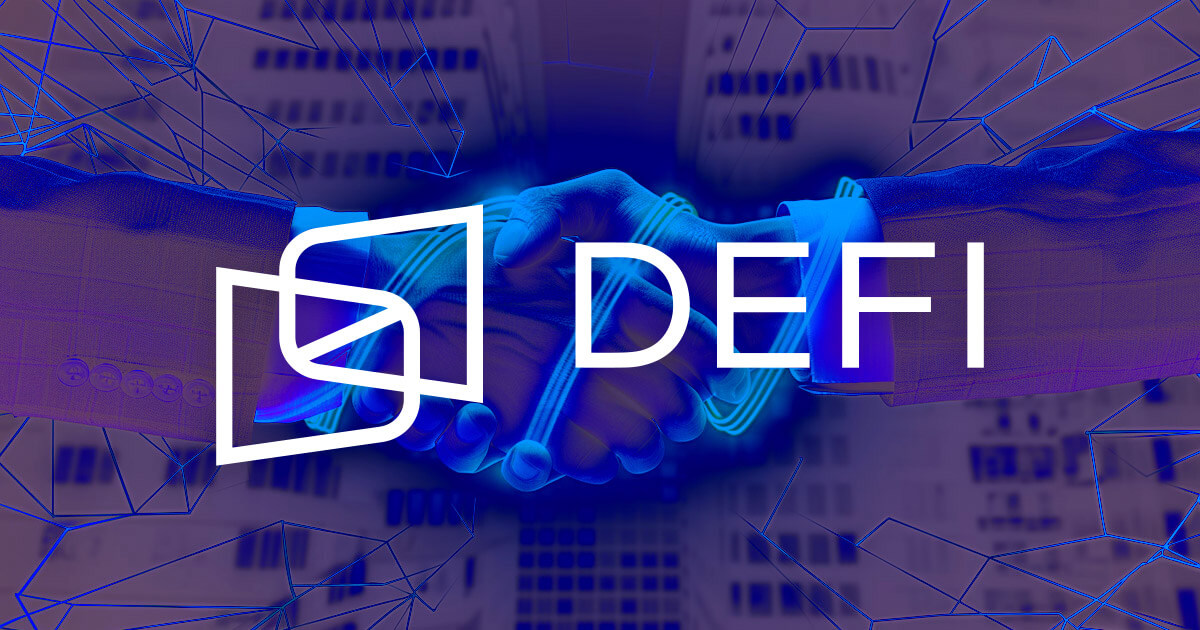DeFi
Transforming DeFi with Reliable On-Chain Data Feeds

The ability of decentralized finance (DeFi) to provide financial services directly to customers has revolutionary potential. The success of DeFi in the meantime relies on accurate and consistent data transfers.
By providing dependable, low-latency pricing feeds on-chain, a protocol known as Pyth Network aims to become a key platform for DeFi, hence enhancing the functionality and reliability of DeFi applications.
Understanding the Role of Oracles in DeFi
Oracles are necessary for DeFi (Decentralized Finance) as trustworthy data sources as they allow blockchain smart contracts to operate with up-to-date market data. In the lack of oracles, DeFi apps would be limited in their capabilities to using just on-chain data.
Many problems arise when DeFi functions without reliable oracles. Of course, one major issue is incorrect pricing. Accurate asset evaluations might lead to significant financial losses, hence precise price feeds are necessary for lending, borrowing, trading, and derivatives. Exact asset values are required for these processes.
Another problem is security risks. The dependability of data streams makes DeFi systems manipulable. Malevolent actors may compromise the integrity of the system by using these weaknesses to manipulate prices and conduct fraudulent transactions.
Latency is also rather crucial. DeFi protocols may suffer from missed chances and poor decision-making caused by data transfer delays. For maximum performance, DeFi apps need real-time data.
Oracles are critical to DeFi because they provide data accuracy, enhance security, and lower latency—all required for decentralized financial systems’ smooth and efficient operation.
Introducing Pyth Network
Pyth Network is an oracle protocol that connects market data owners with applications on multiple blockchains. It provides reliable, high-quality, and low-latency data feeds essential for DeFi applications.
Major exchanges and market-making firms make up the almost 100 market data sources that comprise Pyth Network. Comprehensive and reliable data are ensured in this manner. Pyth Network is widely known in the DeFi market, with over 350 protocols dispersed across over 55 blockchains.
Pyth Network provides many necessary tools to developers. Price Feeds service prices over 500 assets in real time, ensuring DeFi applications can access accurate market data.
Useful for settlement and research, the Benchmarks offering offers historical price data for usage both on-chain and off-chain. Entropy product also generates secure random numbers on the blockchain for applications needing certified unpredictability.
Pyth Network’s broad developer product range and robust network of data providers might make it crucial to DeFi for trustworthy market data.
How Pyth Network Works
Pyth Network links blockchain-based Oracle software, data suppliers, and applications that utilize its price information. For many assets, real-time market data is provided by more than 100 organizations, including big exchanges and market-making firms. Multiple providers ensure reliable and solid data, which reduces the likelihood of errors and manipulation.
The central Oracle software of Pyth’s processes and gathers data from many vendors. It calculates a confidence interval to illustrate the reliability of the information and combines the pricing inputs into a single price for each asset using a sophisticated algorithm. Blockchain verification of this process ensures its transparency.
Pyth price feeds are used by applications that access exact, real-time data for lending, borrowing, trading, and derivatives. They get the data on chain as needed to ensure its currentness and lessen latency issues. This on-demand approach supports quickly evolving marketplaces where instantaneous data is crucial.
Pyth Network relies on reliable on-chain Oracle software, reliable data providers, and easy application interaction to ensure that DeFi applications operate with maximum accuracy, security, and efficiency. It is partly for this that decentralized finance is expanding and reliable.
Contribution of Pyth to the DeFi Ecosystem
By offering accurate and trustworthy price feeds, Pyth Network enhances DeFi applications, enabling these systems to operate with great confidence in their financial data.
Transaction integrity has to be maintained, financial inequalities have to be prevented, and reliable price feeds have to guard against abuse caused by false data. The trust this reliability creates between developers and customers will determine how DeFi solutions are developed and used.
It is clear from the fact that Pyth Network is used by over 350 protocols and is linked to more than 55 blockchain ecosystems how much various DeFi platforms rely on its data. Pyth supports several blockchains so that many applications and users may access its great data. This compatibility will allow Pyth’s reliable data to be used by numerous DeFi protocols, hence enhancing their security and use.
With over 450 price feeds covering a wide variety of financial assets, including US equities, commodities and cryptocurrencies, Pyth Network meets the many needs of the DeFi ecosystem. Because of precise, real-time price information, DeFi systems can provide sophisticated and reliable financial services for trading, lending, and derivatives. This wide asset coverage not only satisfies a variety of consumer needs but also enables DeFi to develop innovative financial solutions.
The accurate and reliable price inputs from Pyth Network greatly influence the DeFi ecology. Its wide applicability and extensive asset coverage enhance the possibilities of DeFi apps, allowing a range of financial products and expanding the boundaries of decentralized finance.
Participation of the Community and Governance
The Pyth Network is governed by the PYTH token, which is necessary to decentralized decision-making and participation incentive. A structured staking and voting process allows PYTH token holders to influence the network’s future.
Token owners who want to participate in governance must tie up their PYTH tokens for a certain period. Stacked tokens provide their holders voting power because each token is worth one vote. Decisions are ensured to reflect the interests of the community at large via the democratic process.
To launch a proposal, token holders must contribute at least 0.25 percent of all PYTH tokens. Proposals must pass with a majority of “yes” votes and a certain agreed-upon quorum within seven days. The type of proposal influences the quorum required, which ensures that more significant changes get greater support.
Among the numerous topics that suggestions might cover are update costs, reward distribution, software improvements, and new price feeds. Another one may be choosing data publishers that maintain strict standards of authenticity and trustworthiness. These many proposal types allow for comprehensive network improvements when the community participates.
Pyth’s management depends on community involvement. A lively and engaged community guarantees the network’s decentralization and reflects user interests. This involvement allows the network to respond to new issues with better security and operation.
Conclusion
By delivering reliable on-chain data feeds, Pyth Network is promoting decentralized finance (DeFi) and improving the precision and security of DeFi applications. Including Pyth’s solutions into their platforms and participating in its governance would help developers and other stakeholders advance the DeFi sector’s ongoing innovation and progress.
The ability of decentralized finance (DeFi) to provide financial services directly to customers has revolutionary potential. The success of DeFi in the meantime relies on accurate and consistent data transfers.
By providing dependable, low-latency pricing feeds on-chain, a protocol known as Pyth Network aims to become a key platform for DeFi, hence enhancing the functionality and reliability of DeFi applications.
Understanding the Role of Oracles in DeFi
Oracles are necessary for DeFi (Decentralized Finance) as trustworthy data sources as they allow blockchain smart contracts to operate with up-to-date market data. In the lack of oracles, DeFi apps would be limited in their capabilities to using just on-chain data.
Many problems arise when DeFi functions without reliable oracles. Of course, one major issue is incorrect pricing. Accurate asset evaluations might lead to significant financial losses, hence precise price feeds are necessary for lending, borrowing, trading, and derivatives. Exact asset values are required for these processes.
Another problem is security risks. The dependability of data streams makes DeFi systems manipulable. Malevolent actors may compromise the integrity of the system by using these weaknesses to manipulate prices and conduct fraudulent transactions.
Latency is also rather crucial. DeFi protocols may suffer from missed chances and poor decision-making caused by data transfer delays. For maximum performance, DeFi apps need real-time data.
Oracles are critical to DeFi because they provide data accuracy, enhance security, and lower latency—all required for decentralized financial systems’ smooth and efficient operation.
Introducing Pyth Network
Pyth Network is an oracle protocol that connects market data owners with applications on multiple blockchains. It provides reliable, high-quality, and low-latency data feeds essential for DeFi applications.
Major exchanges and market-making firms make up the almost 100 market data sources that comprise Pyth Network. Comprehensive and reliable data are ensured in this manner. Pyth Network is widely known in the DeFi market, with over 350 protocols dispersed across over 55 blockchains.
Pyth Network provides many necessary tools to developers. Price Feeds service prices over 500 assets in real time, ensuring DeFi applications can access accurate market data.
Useful for settlement and research, the Benchmarks offering offers historical price data for usage both on-chain and off-chain. Entropy product also generates secure random numbers on the blockchain for applications needing certified unpredictability.
Pyth Network’s broad developer product range and robust network of data providers might make it crucial to DeFi for trustworthy market data.
How Pyth Network Works
Pyth Network links blockchain-based Oracle software, data suppliers, and applications that utilize its price information. For many assets, real-time market data is provided by more than 100 organizations, including big exchanges and market-making firms. Multiple providers ensure reliable and solid data, which reduces the likelihood of errors and manipulation.
The central Oracle software of Pyth’s processes and gathers data from many vendors. It calculates a confidence interval to illustrate the reliability of the information and combines the pricing inputs into a single price for each asset using a sophisticated algorithm. Blockchain verification of this process ensures its transparency.
Pyth price feeds are used by applications that access exact, real-time data for lending, borrowing, trading, and derivatives. They get the data on chain as needed to ensure its currentness and lessen latency issues. This on-demand approach supports quickly evolving marketplaces where instantaneous data is crucial.
Pyth Network relies on reliable on-chain Oracle software, reliable data providers, and easy application interaction to ensure that DeFi applications operate with maximum accuracy, security, and efficiency. It is partly for this that decentralized finance is expanding and reliable.
Contribution of Pyth to the DeFi Ecosystem
By offering accurate and trustworthy price feeds, Pyth Network enhances DeFi applications, enabling these systems to operate with great confidence in their financial data.
Transaction integrity has to be maintained, financial inequalities have to be prevented, and reliable price feeds have to guard against abuse caused by false data. The trust this reliability creates between developers and customers will determine how DeFi solutions are developed and used.
It is clear from the fact that Pyth Network is used by over 350 protocols and is linked to more than 55 blockchain ecosystems how much various DeFi platforms rely on its data. Pyth supports several blockchains so that many applications and users may access its great data. This compatibility will allow Pyth’s reliable data to be used by numerous DeFi protocols, hence enhancing their security and use.
With over 450 price feeds covering a wide variety of financial assets, including US equities, commodities and cryptocurrencies, Pyth Network meets the many needs of the DeFi ecosystem. Because of precise, real-time price information, DeFi systems can provide sophisticated and reliable financial services for trading, lending, and derivatives. This wide asset coverage not only satisfies a variety of consumer needs but also enables DeFi to develop innovative financial solutions.
The accurate and reliable price inputs from Pyth Network greatly influence the DeFi ecology. Its wide applicability and extensive asset coverage enhance the possibilities of DeFi apps, allowing a range of financial products and expanding the boundaries of decentralized finance.
Participation of the Community and Governance
The Pyth Network is governed by the PYTH token, which is necessary to decentralized decision-making and participation incentive. A structured staking and voting process allows PYTH token holders to influence the network’s future.
Token owners who want to participate in governance must tie up their PYTH tokens for a certain period. Stacked tokens provide their holders voting power because each token is worth one vote. Decisions are ensured to reflect the interests of the community at large via the democratic process.
To launch a proposal, token holders must contribute at least 0.25 percent of all PYTH tokens. Proposals must pass with a majority of “yes” votes and a certain agreed-upon quorum within seven days. The type of proposal influences the quorum required, which ensures that more significant changes get greater support.
Among the numerous topics that suggestions might cover are update costs, reward distribution, software improvements, and new price feeds. Another one may be choosing data publishers that maintain strict standards of authenticity and trustworthiness. These many proposal types allow for comprehensive network improvements when the community participates.
Pyth’s management depends on community involvement. A lively and engaged community guarantees the network’s decentralization and reflects user interests. This involvement allows the network to respond to new issues with better security and operation.
Conclusion
By delivering reliable on-chain data feeds, Pyth Network is promoting decentralized finance (DeFi) and improving the precision and security of DeFi applications. Including Pyth’s solutions into their platforms and participating in its governance would help developers and other stakeholders advance the DeFi sector’s ongoing innovation and progress.
DeFi
Pump.Fun is revolutionizing the Ethereum blockchain in terms of daily revenue

The memecoin launchpad saw the largest daily revenue in all of DeFi over the past 24 hours.
Memecoin launchpad Pump.Fun has recorded the highest gross revenue in all of decentralized finance (DeFi) in the last 24 hours, surpassing even Ethereum.
The platform has raised $867,429 in the past 24 hours, compared to $844,276 for Ethereum, according to DeFiLlama. Solana-based Telegram trading bot Trojan was the third-highest revenue generator of the day, as memecoin infrastructure continues to dominate in DeFi.
Pump.Fun generates $315 million in annualized revenue according to DeFiLlama, and has averaged $906,160 per day over the past week.
Income Ranking – Source: DeFiLlama
The memecoin frenzy of the past few months is behind Pump.fun’s dominance. Solana-based memecoins have been the main drug of choice for on-chain degenerates.
The app allows non-technical users to launch their own tokens in minutes. Users can spend as little as $2 to launch their token and are not required to provide liquidity up front. Pump.Fun allows new tokens to trade along a bonding curve until they reach a set market cap of around $75,000, after which the bonding curve will then be burned on Raydium to create a safe liquidity pool.
Pump.Fun generates revenue through accrued fees. The platform charges a 1% fee on transactions that take place on the platform. Once a token is bonded and burned on Raydium, Pump.fun is no longer able to charge the 1% fee.
Ethereum is the blockchain of the second-largest cryptocurrency, Ether, with a market cap of $395 billion. It powers hundreds of applications and thousands of digital assets, and backs over $60 billion in value in smart contracts.
Ethereum generates revenue when users pay fees, called gas and denominated in ETH, to execute transactions and smart contracts.
DeFi
DeFi technologies will improve trading desk with zero-knowledge proofs

DeFi Technologies, a Canadian company financial technology companyis set to enhance its trading infrastructure through a new partnership with Zero Computing, according to a July 30 statement shared with CryptoSlate.
The collaboration aims to integrate zero-knowledge proof tools to boost operations on the Solana And Ethereum blockchains by optimizing its ability to identify and execute arbitrage opportunities.
Additionally, it will improve the performance of its DeFi Alpha trading desk by enhancing its use of ZK-enabled maximum extractable value (MEV Strategies).
Zero knowledge Proof of concept (ZKP) technology provides an additional layer of encryption to ensure transaction confidentiality and has recently been widely adopted in cryptographic applications.
Optimization of trading strategies
DeFi Technologies plans to use these tools to refine DeFi Alpha’s ability to spot low-risk arbitrage opportunities. The trading desk has already generated nearly $100 million in revenue this year, and this new partnership is expected to further enhance its algorithmic strategies and market analysis capabilities.
Zero Computing technology will integrate ZKP’s advanced features into DeFi Alpha’s infrastructure. This upgrade will streamline trading processes, improve transaction privacy, and increase operational efficiency.
According to DeFi Technologies, these improvements will increase the security and sophistication of DeFi Alpha’s trading strategies.
The collaboration will also advance commercial approaches for ZK-enabled MEVs, a new concept in Motor vehicles which focuses on maximizing value through transaction fees and arbitrage opportunities within block production.
Additionally, DeFi Technologies plans to leverage Zero Computing technology to develop new financial products, such as zero-knowledge index exchange-traded products (ETPs).
Olivier Roussy Newton, CEO of DeFi Technologies, said:
“By integrating their cutting-edge zero-knowledge technology, we not only improve the efficiency and privacy of our transactions, but we also pave the way for innovative trading strategies.”
Extending Verifiable Computing to Solana
According to the release, Zero Computing has created a versatile, chain-agnostic platform for generating zero-knowledge proofs. The platform currently supports Ethereum and Solana, and the company plans to expand compatibility with other blockchains in the future.
The company added that it is at the forefront of introducing verifiable computation to the Solana blockchain, enabling complex computations to be executed off-chain with on-chain verification. This development represents a significant step in the expansion of ZKPs across various blockchain ecosystems.
Mentioned in this article
Latest Alpha Market Report
DeFi
Elastos’ BeL2 Secures Starknet Grant to Advance Native Bitcoin Lending and DeFi Solutions

Singapore, Asia, July 29, 2024, Chainwire
- Elastos BeL2 to Partner with StarkWare to Integrate Starknet’s ZKPs and Cairo Programming Language with BeL2 for Native DeFi Applications
- Starknet integration allows BeL2 to provide smart contracts and dapps without moving Bitcoin assets off the mainnet
- Starknet Exchange Validates the Strength of BeL2’s Innovation and Leadership in the Native Bitcoin Ecosystem
Elastos BeL2 (Bitcoin Elastos Layer2) has secured a $25,000 grant from Starknet, a technology leader in the field of zero-knowledge proofs (ZKPs). This significant approval highlights the Elastos BeL2 infrastructure and its critical role in advancing Bitcoin-native DeFi, particularly Bitcoin-native lending. By integrating Starknet’s ZKPs and the Cairo programming language, Elastos’ BeL2 will enhance its ability to deliver smart contracts and decentralized applications (dapps) without moving Bitcoin (BTC) assets off the mainnet. This strategic partnership with Starknet demonstrates the growing acceptance and maturity of the BeL2 infrastructure, reinforcing Elastos’ commitment to market leadership in the evolving Bitcoin DeFi market.
Starknet, developed by StarkWare, is known for its advancements in ZKP technology, which improves the privacy and security of blockchain transactions. ZKPs allow one party to prove to another that a statement is true without revealing any information beyond the validity of the statement itself. This technology is fundamental to the evolution of blockchain networks, which will improve BeL2’s ability to integrate complex smart contracts while preserving the integrity and security of Bitcoin.
“We are thrilled to receive this grant from Starknet and announce our partnership to build tighter integrations with its ZKP technology and the Cairo programming language,” said Sasha Mitchell, Head of Bitcoin Layer 2 at Elastos. “This is a major milestone for BeL2 and a true recognition of the maturity and capabilities of our core technology. This support will allow us to further develop our innovation in native Bitcoin lending as we look to capitalize on the growing acceptance of Bitcoin as a viable alternative financial system.”
A closer integration with Cairo will allow BeL2 to leverage this powerful programming language to enhance Bitcoin’s capabilities and deliver secure, efficient, and scalable decentralized finance (DeFi) applications. Specifically, the relationship with Cairo reinforces BeL2’s core technical innovations, including:
- ZKPs ensure secure and private verification of transactions
- Decentralized Arbitrage Using Collateralized Nodes to Supervise and Enforce Fairness in Native Bitcoin DeFi
- BTC Oracle (NYSE:) facilitates cross-chain interactions where information, not assets, is exchanged while Bitcoin remains on the main infrastructure
BeL2’s vision goes beyond technical innovation and aims to innovate by creating a new financial system. The goal is to build a Bitcoin-backed Bretton Woods system, address global debt crises, and strengthen Bitcoin’s role as a global hard currency. This new system will be anchored in the integrity and security of Bitcoin, providing a stable foundation for decentralized financial applications.
As integration with Starknet and the Cairo programming language continues, BeL2 will deliver further advancements in smart contract capabilities, decentralized arbitration, and innovative financial products. At Token 2049, BeL2 will showcase further innovations in its core technologies, including arbitrators, that will underscore Elastos’ vision for a fairer decentralized financial system rooted in Bitcoin.
About Elastos
Elastos is a public blockchain project that integrates blockchain technology with a suite of redesigned platform components to produce a modern Internet infrastructure that provides intrinsic privacy and ownership protection for digital assets. The mission is to create open source services that are accessible to the world, so developers can create an Internet where individuals own and control their data.
The Elastos SmartWeb platform enables organizations to recalibrate how the Internet operates to better control their own data.
https://www.linkedin.com/company/elastosinfo/
ContactPublic Relations ManagerRoger DarashahElastosroger.darashah@elastoselavation.org
DeFi
Compound Agrees to Distribute 30% of Reserves to COMP Shareholders to End Alleged Attack on Its Governance

Compound will introduce the staking program in exchange for Humpy, a notorious whale accused of launching a governance attack on the protocol, negating a recently adopted governance proposal.
Compound is launching a new staking program for COMP holders as a compromise with Humpy, a notorious DeFi whale accused of launching a governance attack against the veteran DeFi protocol.
On July 29, Bryan Colligan, head of business development at Compound, published a governance proposal outlining plans for a new compound participation product that would pay 30% of the project’s current and future reserves to COMP participants.
Colligan noted that the program was requested by Humpy in exchange for his agreement Proposition 289 — which sought to invest 499,000 COMP worth approximately $24 million into a DeFi vault controlled by Humpy, and which appears to have been forced by Humpy and his associates over the weekend.
“We propose the following staking product that meets Humpy’s stated interests as a recent new delegate and holder of COMP in exchange for the repeal of Proposition 289 due to the governance risks it poses to the protocol,” Colligan said. “The Compound Growth Program…will execute the above commitments, given the immediate repeal of Proposition 289.”
Colligan added that the proposal would expire at 11:59 p.m. EST on July 29. Had Humpy not rescinded Proposition 289, Compound would move forward with it. Proposition 290 — block Humpy using the Compound team’s multi-sig to deploy a new governor contract removing the delegate’s governance power behind Proposition 289.
Hunchback tweeted that Proposition 289 had been repealed a few hours ago. “Glad to have brought Compound Finance back into the spotlight,” they said. added. “StakedComp… finally becomes a yield-generating asset!
Markets reacted favorably to the resolution, with the price of COMP increasing by 6.2% over the past 24 hours, according to CoinGecko.
Attack on governance
Proposition 289 proposed investing 499,000 COMP from the Compound treasury into goldCOMP, a yield-generating vault of the Humpy-linked Golden Boys team.
The proposal passed with nearly 52 percent of the vote on July 28, despite two previous iterations of the proposal being defeated by strong opposition. Can And JulyThe proposals notably asked for only 92,000 COMP, with security researchers warning that any deposit of tokens into the goldCOMP vault would cede their governance power.
In May, Michael Lewellen of Web3 security firm OpenZeppelin, note The first proposal was submitted by a new governance delegate who was suddenly awarded 228,000 COMP by five wallets that got their tokens from the Bybit exchange. Combined with his own tokens, the delegate got 325,333 COMP, which is over 81% of the 400,000 tokens required for a governance proposal to reach quorum.
“We have been alerting the community to the risk that these delegates could support a potential attack on governance,” Lewellen said. “The timing of the new proposal and these recent delegations are suspect.”
Read more: Compound community accuses famous whale of attacking engineering governance
-

 Videos4 weeks ago
Videos4 weeks agoAbsolutely massive: the next higher Bitcoin leg will shatter all expectations – Tom Lee
-

 News12 months ago
News12 months agoVolta Finance Limited – Director/PDMR Shareholding
-

 News12 months ago
News12 months agoModiv Industrial to release Q2 2024 financial results on August 6
-

 News12 months ago
News12 months agoApple to report third-quarter earnings as Wall Street eyes China sales
-

 News12 months ago
News12 months agoNumber of Americans filing for unemployment benefits hits highest level in a year
-

 News1 year ago
News1 year agoInventiva reports 2024 First Quarter Financial Information¹ and provides a corporate update
-

 News1 year ago
News1 year agoLeeds hospitals trust says finances are “critical” amid £110m deficit
-

 Markets1 year ago
Markets1 year agoWhale Investments in Bitcoin Hit $100 Billion in 2024, Fueling Insane Investor Optimism ⋆ ZyCrypto
-

 DeFi1 year ago
DeFi1 year ago🏴☠️ Pump.Fun operated by Insider Exploit
-

 Videos1 year ago
Videos1 year ago$1,000,000 worth of BTC in 2025! Get ready for an UNPRECEDENTED PRICE EXPLOSION – Jack Mallers
-

 Videos1 year ago
Videos1 year agoABSOLUTELY HUGE: Bitcoin is poised for unabated exponential growth – Mark Yusko and Willy Woo
-

 Tech1 year ago
Tech1 year agoBlockDAG ⭐⭐⭐⭐⭐ Review: Is It the Next Big Thing in Cryptocurrency? 5 questions answered





